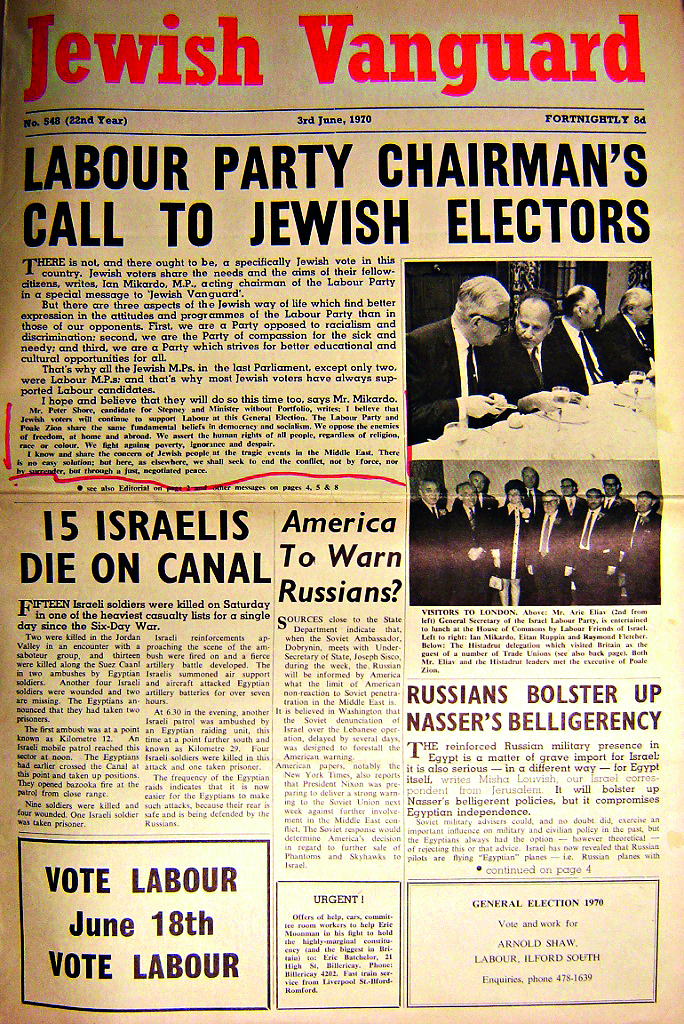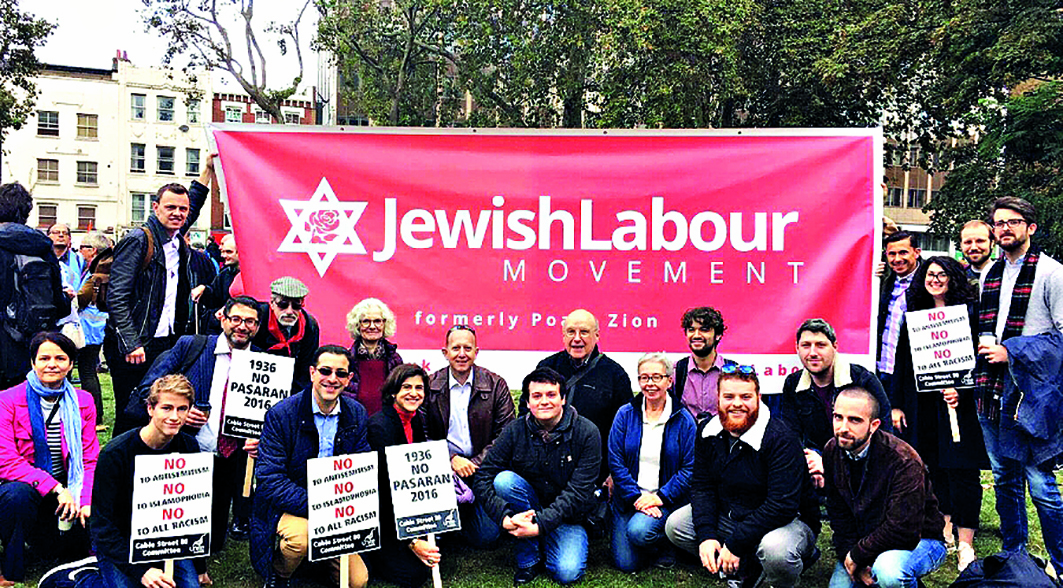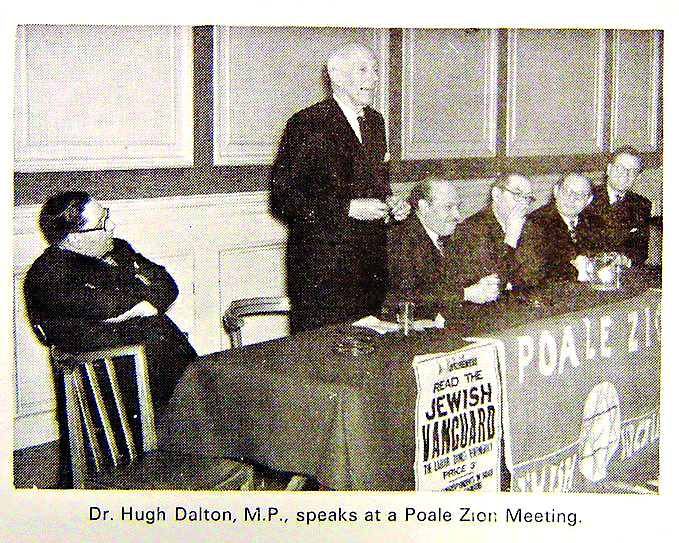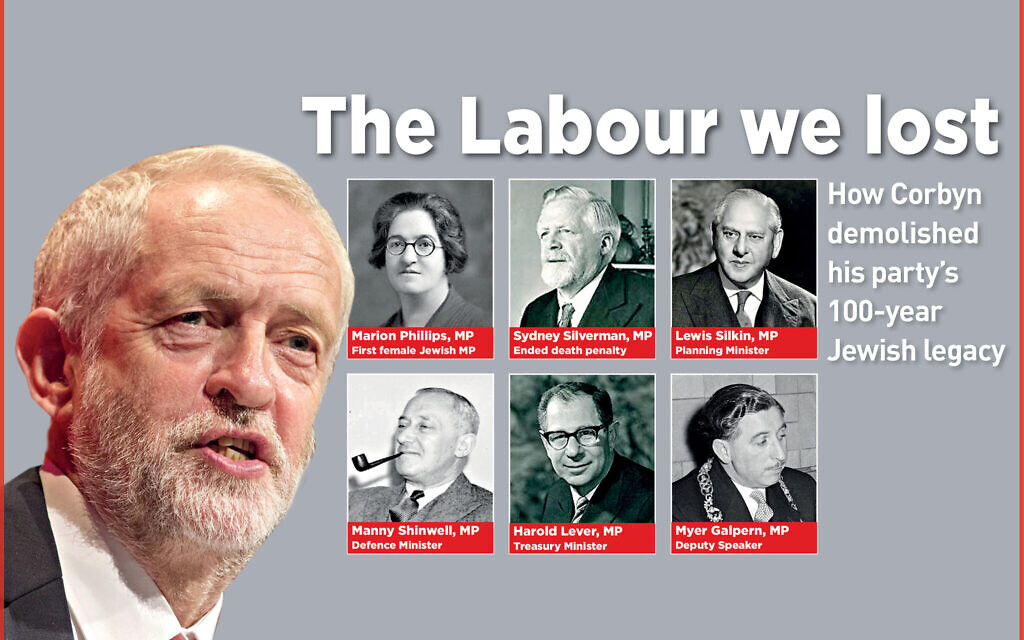The Labour we lost: Jews, Jeremy Corbyn and a fraying bond
Next year marks the centenary of the Jewish Labour Movement's affiliation with the Labour Party. We look at the rich legacy of Jewish support for the left many see as under threat
Next year is the centenary of the Jewish Labour Movement (JLM)’s affiliation with the party. But rather than prepare for a celebration, many in the community fear the prospect of a Jeremy Corbyn government.
The JLM, officially affiliated with the party since 1920, said it would not campaign for candidates “unless in exceptional circumstances”. Meanwhile, looming large on the horizon, a verdict on whether the party is institutionally antisemitic is expected from the Equalities and Human Rights Commission early next year.
It is a remarkable indictment for a party that boasts a rich legacy of Jewish support intertwined with Poale Zion, as the JLM was once called.
Get The Jewish News Daily Edition by email and never miss our top stories Free Sign Up
Poale Zion emerged from Jewish trade unions and a flourishing political scene that featured a flurry of working men’s clubs, debating societies and English and Yiddish language newspapers in London’s East End. It played a pivotal role in the Labour Party’s commitment to a Jewish national home laid out in its War Aims Memorandum published in August 1917.

“Throughout its 99-year history, Poale Zion and Jewish Labour activists have been members of Parliament, civic leaders and councillors,” said Jewish Labour Movement national secretary Peter Mason. “They’ve become ingrained in the fabric of the Labour of Party that always believed in equality, social justice and the rights of minorities.”
He added: “We’re now in a situation that 99 years on from those earliest moments of people like Ben Gurion coming to Britain to build the British socialist Zionist tradition that the Labour Party that used to represent us has now allowed itself to be captured by this intolerable populist, antisemitic hard left tradition. All of that’s been put in jeopardy,”
Miriam Mirwitch, 26, from London, joined the Labour Party at 16 in response to what she saw as the corrosive impact of austerity measures on her community. “I got really angry about it. I wanted to make a change and I thought that the best way to create that change was to get involved in the Labour movement,” she said.
Mirwitch, who serves on the Jewish Labour Movement’s national executive committee, hailed the “proud history of Jewish Labour activists,” citing the example of MPs Emanuel (Manny) Shinwell and Ruth Smeeth.
Over recent years, the activist found “a tension between being Jewish and being a Labour Party activist” and has received online abuse, including messages containing antisemitic tropes and threats and “very very nasty replies” on social media.
“All of us have experienced antisemitic comments at local meetings, and obviously I firmly believe it is a minority who are like this but the issue is that it’s very present in the structures of the party and that’s what makes it institutional,” she said.
But Mirwitch, who identified as a “stay-fighter,” added: “We need to stay involved in the Labour Party and speaking out if you can because if you leave there’s no one left to speak out against antisemitism, but I also have a huge amount of respect for people who decided that they had to leave.”

Community involvement in the Labour Party rose in the wake of mass migration from Eastern Europe from 1870 and waning support for the Liberal Party, a party once regarded by many as the natural home of British Jews.
Dr Ben Gidley, senior lecturer at Birkbeck and an associate of the Pears Institute, said: “In the interwar years, particularly in places such as the East End of London, there were many Jewish activists in the Communist Party and in the Labour Party, although many Jews still continued to vote for Liberals out of an older loyalty.
“Within those working-class communities where there were a lot of Jews, the garment industry in particular, but also cabinet makers, the trade unions in those sectors were often attached to the Labour Party.”
Since its founding in 1900, the Labour Party has enjoyed a long history of Jewish contributions, with a staggering 80 peers, 90 MPs and 33 ministers serving in Parliament, and some 19 private members’ bills put forward.
“Many of them [Jewish MPs] made significant contributions to the history of the Labour Party and indeed of Britain,” said Gidley, citing Tom Myers, the first Jewish Labour MP, elected 100 years ago, and Marion Phillips, the first female Jewish MP.
Perhaps the most well-known figure was Scottish MP and peer Emanuel (Manny) Shinwell, Luciana Berger’s great-uncle, who was born to a Polish family in the East End and raised in Glasgow. He made significant contributions towards protecting workers’ rights.
Serving in the House of Commons for 40 years, he rose through the ranks of the party and was appointed chairman and even minister under three Labour governments. The Labour titan served as a minister in Ramsay Macdonald and Clement Attlee’s Labour governments, and later became a member of the House of Lords.
He famously crossed the floor in 1938 to slap Conservative MP Commander Robert Tatton Bower, who taunted him during a heated exchange on the Spanish Civil War and suggested that he “go back to Poland”. Dr Hugh Dalton MP at a Poale Zion meeting (archive)
Dr Hugh Dalton MP at a Poale Zion meeting (archive)
Another towering figure was the MP Sydney Silverman, perhaps best remembered for leading a 30-year push for the abolition of the death penalty and bringing forward the private member’s bill in 1964 that led to a change in the law.
Born to a family of drapers in Liverpool, he was elected to Parliament in 1935 and retained his seat until his death in 1968. Serving as chairman of the British arm of the World Jewish Congress, he visited Nazi camps after the Second World War and raised the plight of Jewish refugees in Parliament.
Today the relationship between the Labour Party and the Jewish community appears to some to be beyond repair. But the Battle of Cable Street, often seen as an iconic historical moment allying the Jewish community with the left, offers many lessons for the party.
The day entered the annals of history when thousands of anti-fascists came out on the streets of London’s East End to block Oswald Mosley’s Blackshirts march.
“It’s the antisemitism they recognised that wore blackshirts,” said Gidley. “It bought into anti-fascism, but it didn’t necessarily recognise other forms of antisemitism. It didn’t know how to deal with the other faces of antisemitism.”

Thank you for helping to make Jewish News the leading source of news and opinion for the UK Jewish community. Today we're asking for your invaluable help to continue putting our community first in everything we do.
For as little as £5 a month you can help sustain the vital work we do in celebrating and standing up for Jewish life in Britain.
Jewish News holds our community together and keeps us connected. Like a synagogue, it’s where people turn to feel part of something bigger. It also proudly shows the rest of Britain the vibrancy and rich culture of modern Jewish life.
You can make a quick and easy one-off or monthly contribution of £5, £10, £20 or any other sum you’re comfortable with.
100% of your donation will help us continue celebrating our community, in all its dynamic diversity...
Engaging
Being a community platform means so much more than producing a newspaper and website. One of our proudest roles is media partnering with our invaluable charities to amplify the outstanding work they do to help us all.
Celebrating
There’s no shortage of oys in the world but Jewish News takes every opportunity to celebrate the joys too, through projects like Night of Heroes, 40 Under 40 and other compelling countdowns that make the community kvell with pride.
Pioneering
In the first collaboration between media outlets from different faiths, Jewish News worked with British Muslim TV and Church Times to produce a list of young activists leading the way on interfaith understanding.
Campaigning
Royal Mail issued a stamp honouring Holocaust hero Sir Nicholas Winton after a Jewish News campaign attracted more than 100,000 backers. Jewish Newsalso produces special editions of the paper highlighting pressing issues including mental health and Holocaust remembrance.
Easy access
In an age when news is readily accessible, Jewish News provides high-quality content free online and offline, removing any financial barriers to connecting people.
Voice of our community to wider society
The Jewish News team regularly appears on TV, radio and on the pages of the national press to comment on stories about the Jewish community. Easy access to the paper on the streets of London also means Jewish News provides an invaluable window into the community for the country at large.
We hope you agree all this is worth preserving.
-
By Brigit Grant
-
By Laurent Vaughan - Senior Associate (Bishop & Sewell Solicitors)
-
By Laurent Vaughan - Senior Associate (Bishop & Sewell Solicitors)
-
By Laurent Vaughan - Senior Associate (Bishop & Sewell Solicitors)
-
By Laurent Vaughan - Senior Associate (Bishop & Sewell Solicitors)






















